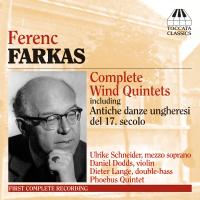
Great Panache
The complete
wind quintets of
Ferenc Farkas -
appreciated by
PAUL SARCICH'... the whole set simply reeks charm.'
|

|
It is inevitable that in a complex musical world, some composers will slip under the radar screen. Thanks to this disc, my personal antennae will in future be attuned to catching more sightings of Ferenc Farkas (1905-2000), a Hungarian composer whose life neatly spanned the twentieth century. Belonging to the generation sandwiched between the explosion that was Bartók and Kodály, and the avant-garde luminaries Ligeti and Kurtág (the latter were both pupils of his at some stage), perhaps it is not so surprising, but it is a great shame that only a few pieces out of his seven-hundred-odd have ever made it to the repertoire. In addition to being Hungarian to his roots (he went folksong collecting with the best of them), he also studied with Respighi, whose melodiousness and command of orchestration obviously rubbed off.
Not to beat about the bush, the man's technical brilliance is astonishing -- a rock-solid craftsmanship allied to a plentiful musical inventiveness. And if any instrumental combination could challenge this, it would surely be the wind quintet, a medium that composers overall have not exactly rushed to embrace. Five completely heterogeneous wind instruments are a challenge to anyone's technique.
This disc begins with the Serenade, which lives up to its title, and is sunnily tackled by the Pheobus Quintet, a youthful (if the inlay photos do not lie) mostly German group, in which Farkas throws down to gauntlet to many of the (particularly) French composers who have produced similar pieces. It is only marred by hornist Martin Roos being not quite safe with the terrifyingly high horn solo in the third movement. Against that, I have to say that not being a particular fan of the flute, I was nevertheless drawn to Christoph Bösch's often near-vibratoless sound.
Quattro Pezzi is for the unusual combination of the quintet with double-bass soloist. Bassist Dieter Lange could have been placed more forward in the mix, the better to appreciate his clean, articulate playing. This is a darker, more 'academic' work than the Serenade, not as immediately tuneful but giving the bass a genuine leading part and above all taking it seriously and putting it through its paces. The result should I hope catch the ears of a few bassists -- it surely must be a candidate for their repertoire.
Continue >>
Copyright © 4 October 2007
Paul Sarcich, London UK

|

